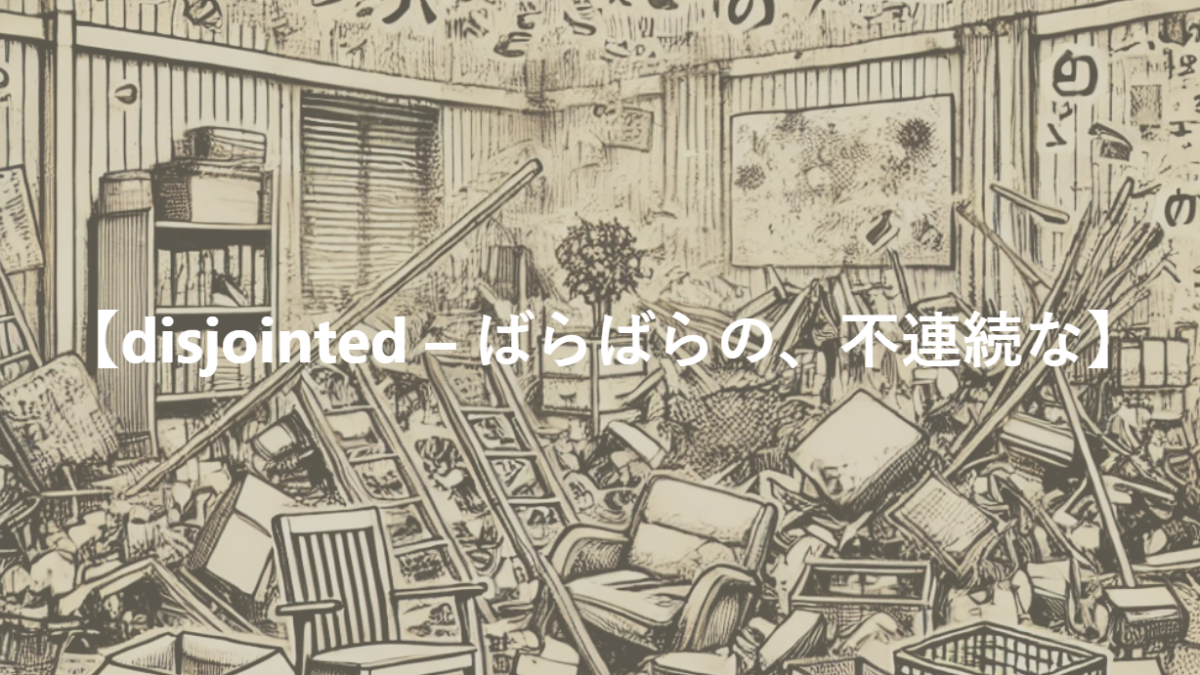派生語・語源・類義語・反対語・例文
派生語や動詞の活用
派生語や関連語
- Disjointedly:
「ばらばらに」「支離滅裂に」を意味する副詞。 - Disjointedness:
「ばらばらであること」「支離滅裂であること」を意味する名詞。 - Disjoint:
「ばらばらにする」「分解する」といった意味の動詞。
数学では、互いに交わらない集合を指す形容詞としても使用されます。
Disjointという動詞の活用形
- Base Form (基本形): disjoint
- Past Simple (単純過去形): disjointed
- Past Participle (過去分詞): disjointed
- Present Participle / Gerund (現在分詞): disjointing
- Third Person Singular (三人称単数現在形): disjoints
【disjointed – ばらばらの、不連続な】という単語の語源とか由来を知っていますか?
「disjointed」は、接頭辞「dis-」(逆、反対)と「jointed」(接続された)から派生した形容詞です。この語は、何かが一体感を持たずにばらばらになっている状態を表します。元々は物理的な意味合いを持ち、関節やつなぎ目が崩れたり切れたりする様子を指していましたが、転じて抽象的な文脈でも用いられるようになりました。
「disjointed」は、文や議論が論理的なつながりを持たずにまとまっていない状態を指します。たとえば、人々が会話をする際に、話題が飛び飛びになっていることでコミュニケーションがスムーズに進まない場面で使用されることがあります。また、文章や文章の構造が整っておらず、読み手に理解しにくいものも「disjointed」と形容されることがあります。
この単語の類義語・反対語を教えてください。
類義語:
- Incoherent(不連続な)
- Fragmented(断片的な)
反対語:
- Coherent(一貫した)
- Continuous(連続的な)
この単語に似た単語で間違いやすい単語はありますか?
「disjointed」は「incoherent」や「fragmented」と意味が近いため、これらの単語と混同されることがあります。適切な文脈で使用することが重要です。
この単語を使った例文を5つほど教えてください。
- His speech was so disjointed that it was difficult to follow his main points. (彼のスピーチは非常にばらばらであり、主要なポイントを追うのが難しかった。)
- The novel’s plot felt disjointed, with events that seemed unrelated to each other. (その小説のプロットはばらばらで、互いに関連のない出来事があった。)
- The team’s disjointed performance on the field reflected a lack of coordination and communication. (チームの野球場でのばらばらなパフォーマンスは、調整とコミュニケーションの不足を反映していた。)
- The lecture’s disjointed structure made it challenging for the students to grasp the main concepts. (講義のばらばらな構造は、学生が主要な概念を理解するのを難しくしていた。)
- The documentary presented a disjointed narrative, jumping between different time periods without clear transitions. (そのドキュメンタリーはばらばらなナラティブを提示し、明確な遷移なしに異なる時期を行き来していた。)
コロケーション
- Disjointed narrative
意味:ばらばらの物語
連続性や一貫性に欠け、断片的に進行する物語を指します。 - Disjointed speech
意味:ばらばらのスピーチ
話の内容がまとまりがなく、連続性に欠けるスピーチを意味します。 - Disjointed conversation
意味:不連続な会話
会話の流れが途切れ途切れで、論理的なつながりがない会話を指します。 - Disjointed thoughts
意味:ばらばらの考え
考えやアイデアがまとまっておらず、断片的で論理的に結びついていない状態を表します。 - Disjointed structure
意味:ばらばらの構造
全体として一貫性がなく、部分部分が連携していない構造を指します。 - Disjointed plot
意味:ばらばらのプロット
ストーリーラインが一貫性に欠け、断片的に展開されるプロットを指します。
まず、「Disjointed narrative」は「ばらばらの物語」という意味です。物語が断片的に進行し、一貫性がない状態を指します。
次に、「Disjointed speech」ですが、これは「ばらばらのスピーチ」を意味します。話の内容がまとまりを欠き、流れが途切れ途切れで不連続なスピーチを表します。
「Disjointed conversation」という表現は「不連続な会話」を指します。会話の論理的な流れが途切れたり、連続性に欠ける場合に使われます。
また、「Disjointed thoughts」は「ばらばらの考え」を意味します。考えやアイデアがまとまっておらず、論理的な結びつきがない状態です。
「Disjointed structure」ですが、これは「ばらばらの構造」を指し、全体の連携や一貫性が欠け、まとまりのない構造を表します。
最後に、「Disjointed plot」というコロケーションですが、これは「ばらばらのプロット」を意味します。ストーリーラインが一貫性を持たず、断片的に展開される場合に使われます。
First, “Disjointed narrative” means “a fragmented narrative.” It refers to a story that progresses in fragments and lacks consistency.
Next, “Disjointed speech” means “a fragmented speech.” It describes a speech that lacks coherence, with the flow being choppy and disjointed.
“Disjointed conversation” refers to “a disjointed conversation.” It is used when the logical flow of the conversation breaks down, resulting in a lack of continuity.
Also, “Disjointed thoughts” means “fragmented thoughts.” It refers to ideas or thoughts that are not organized and lack logical connections.
“Disjointed structure” refers to “a fragmented structure.” It describes a structure that lacks overall cohesion or consistency and appears disorganized.
Finally, “Disjointed plot” refers to “a fragmented plot.” It is used when the storyline lacks consistency and unfolds in disjointed segments.
Disjointed を使った英文法問題5問
- The speaker’s presentation was _____, jumping from one topic to another without any clear connection.
- (A) disjointed
- (B) disjointedly
- (C) disjointedness
- (D) disjoint
- The novel’s plot was _____, with seemingly unrelated events and characters that confused the reader.
- (A) disjointed
- (B) disjointedly
- (C) disjointedness
- (D) disjoint
- 解説: 空欄には名詞(plot)を修飾する形容詞が必要です。disjointedは「まとまりのない、支離滅裂な」という意味の形容詞です。
- The patient’s speech was _____, making it difficult for the doctor to understand their symptoms.
- (A) disjointed
- (B) disjointedly
- (C) disjointedness
- (D) disjoint
- 解説: 空欄には名詞(speech)を修飾する形容詞が必要です。disjointedは「まとまりのない、支離滅裂な」という意味の形容詞です。
- The team’s _____ efforts resulted in a lack of coordination and ultimately led to their failure.
- (A) disjointed
- (B) disjointedly
- (C) disjointedness
- (D) disjoint
- 解説: 空欄には名詞(efforts)を修飾する形容詞が必要です。disjointedは「まとまりのない、バラバラな」という意味の形容詞です。
- The old house was a _____ collection of rooms, added on over the years without any clear plan.
- (A) disjointed
- (B) disjointedly
- (C) disjointedness
- (D) disjoint
- 解説: 空欄には名詞(collection)を修飾する形容詞が必要です。disjointedは「まとまりのない、バラバラな」という意味の形容詞です。

